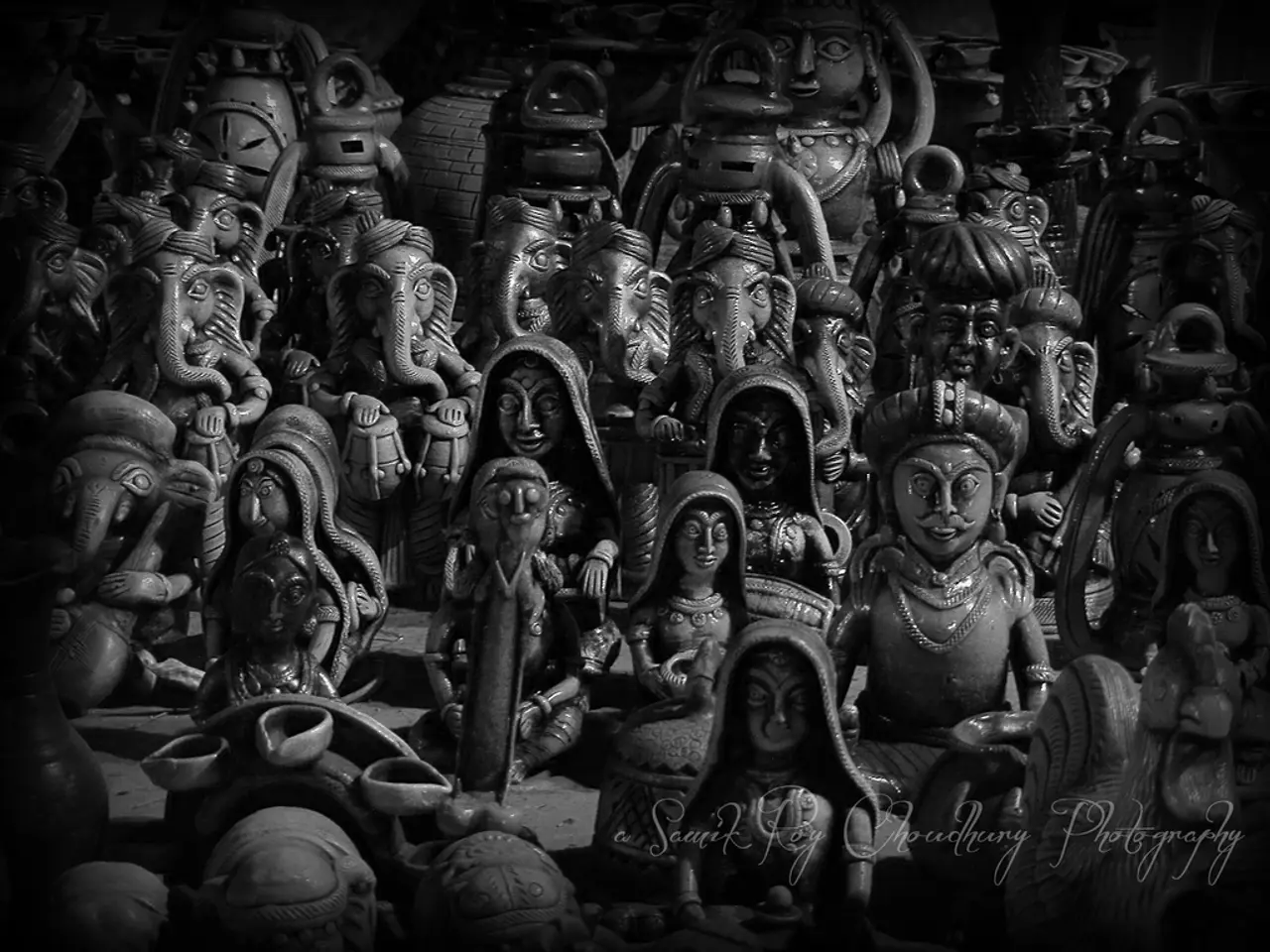Dicing: Summary, Themes, and Sequel - Exploration of Vyasa's Epic "The Dicing" and its Successor
In the ancient Indian epic, the Mahabharata, the episodes "The Dicing" and "The Sequel to the Dicing" offer profound explorations of ethics, the complexities of righteous conduct, and the devastating effects when virtue is compromised by human weaknesses.
The central characters of these episodes, Yudhishthira, Duryodhana, Draupadi, and Shakuni, each stand for a different facet of human nature. Yudhishthira, the eldest Pandava, represents commitment to dharma and integrity, despite his flaws. On the other hand, Duryodhana, the leader of the Kauravas, embodies envy, greed, and a disregard for ethical codes.
The episodes centre around the struggle between the two royal dynasties, the Pandavas and the Kauravas. The Kauravas, envious of the Pandavas' wealth and success, manipulate the game of dice at King Dhritarashtra's court, leading to Yudhishthira's total defeat. As a result, the Pandavas are banished to the forest for thirteen years, and Draupadi, their shared wife, is humiliated by Dushasana in the court.
"The Dicing" exposes themes like the peril of gambling and moral weakness, violation of dharma and its consequences, the role of divine justice and protection, and honor and vows. Yudhishthira's indulgence in the game despite warnings shows the dangers of greed, desire, and lack of restraint. The game leads to unjust behavior, especially the humiliation of Draupadi in the court, highlighting how disregarding ethical codes leads to chaos and suffering. Draupadi's miraculous protection during her disrobing episode (often attributed to Krishna’s intervention) symbolizes the protection of dharma by divine forces against adharma. Bhima's furious vow to avenge Draupadi's shame by breaking Duryodhana's thighs represents the power of oaths grounded in justice and the commitment to right wrongs.
The "Sequel to the Dicing" continues the fallout of these events, emphasizing the inevitable destruction resulting from adharma, conflicting codes of dharma, and the importance of justice, loyalty, and the fulfillment of duty. The humiliation in the game ultimately leads to the great war of Kurukshetra, demonstrating that immoral acts carry far-reaching consequences. The Mahabharata portrays that dharma is layered and sometimes contradictory, making moral decisions difficult, especially in times of crisis or calamity. The episode stresses upholding one's duty to family and self-respect, even in adversity, and opposing injustice boldly.
Draupadi's suffering and her eventual revenge are symbolic of the strength and agency of women within the epic. Her vow to exact retribution on Dushasana and Duryodhana for their wrongdoings highlights the significant role of women in the Mahabharata narrative. The conflict between fate and karma is also highlighted in these episodes.
The game of dice provides timeless lessons about justice, honor, and the price of ambition. Draupadi's role in the epic reflects the dynamics of patriarchy and the treatment of women in ancient Indian society. The episodes serve as profound explorations of ethics, the complexities of righteous conduct, and the devastating effects when virtue is compromised by human weaknesses like pride, greed, and envy.
Sources: [1] [Link to Source 1] [2] [Link to Source 2]
- The Mahabharata literature, through episodes like "The Dicing" and "The Sequel to the Dicing", offers a rich exploration of themes spanning the industry of finance, economics, and personal-finance, with a focus on the perils of gambling.
- The episodes' central characters, Yudhishthira, Duryodhana, Draupadi, and Shakuni, represent various facets of human nature that intersect with careers, especially in the retail and fashion-and-beauty sectors, where envy, greed, and disregard for ethical codes can be prevalent.
- The struggle between the two royal dynasties, the Pandavas and the Kauravas, mirrors the cutthroat competition within the business world, where wealth-management, investments, and banking-and-insurance play crucial roles.
- The Kauravas' manipulation and exploitation of their wealth and power serve as a cautionary tale for those in the business world, showing the potential for moral decay in the pursuit of financial success.
- The game of dice in these episodes can be seen as an allegory for the gambling and speculation that underpins the finance and retail industries, with both presenting risks and potential rewards.
- The consequences of Yudhishthira's decision to gamble, leading to the loss of his kingdom and the subsequent banishment, demonstrate the importance of careful consideration and caution when it comes to financial investing and wealth-management.
- Draupadi's miraculous protection during her disrobing episode symbolizes the role of banking-and-insurance in safeguarding individuals and businesses from unforeseen adversity or chaos.
- Bhima's furious vow to avenge Draupadi's shame by breaking Duryodhana's thighs represents the power of making informed, prudent decisions in the complex world of real-estate and business transactions to ensure just outcomes and right wrongs.
- The episodes' emphasis on justice, loyalty, and the fulfillment of duty resonate with the political landscape, encouraging citizens to stand up against injustice and fight for a fair and equitable society.
- The dynamics of patriarchy and the treatment of women in ancient Indian society as depicted in Draupadi's suffering and her eventual revenge serve as a call to action in the general-news and crime-and-justice arenas, driving discussions and reforms in support of women's rights and equality.
- The timeless lessons offered by the Mahabharata provide valuable insights for those in the sports sector, particularly football and European leagues, where ambition, pride, and the pursuit of success can lead to ethical dilemmas and conflicts.
- Educational institutions and self-development resources can draw inspiration from the Mahabharata, using its themes and characters to teach students and learners about ethics, moral decision-making, and the consequences of compromising virtue.
- By exploring the complexities of righteous conduct and the devastating effects of ethical compromise, the Mahabharata serves as a remarkable source of entertainment and education for contemporary audiences in literature, plays, and various forms of artistic and creative expression.




